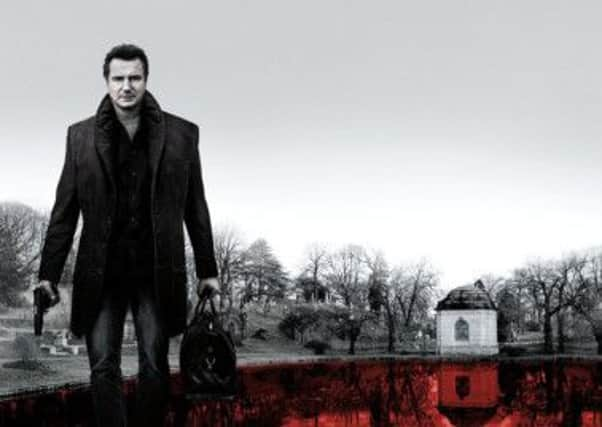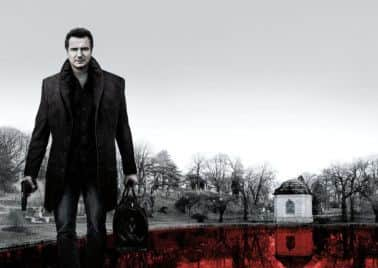Film review: A Walk Among The Tombstones (15)


A Walk Among the Tombstones (15)
Directed by Scott Frank
Starring: Liam Neeson, Dan Stevens, Brian ‘Astro’ Bradley


Star rating: * * * *
Liam Neeson’s transformation into a latter-day Charles Bronson in the wake of Taken has been one of the more peculiar and pleasurable career transitions in recent years, not least because it saved him from all those doomed mentor rolls that had started to become his stock-in-trade. Unfortunately, The Grey aside, the very particular set of skills that make him an appealingly old-school action star have not exactly been utilised in the service of anything worthy of his presence. The likes of Unknown, Taken 2 and this year’s Non-Stop have been little more faded copies offering unsatisfying traces of what make him such an incongruous yet magnetic lead. Mercifully A Walk Among the Tombstones is different. On paper it might seem not seem that way; its kidnapping and no-nonsense protagonist immediately suggesting another Taken clone. But writer/director Scott Frank’s adaptation of Lawrence Block’s detective novel of the same name is unexpectedly lean and mean, a properly grown-up gumshoe thriller that makes full use of its 1990s setting to create an grimy noir that makes the most of Neeson’s dishevelled outlaw appeal.
Neeson plays Matt Scudder, an alcoholic ex-cop scraping a living as an unlicensed private detective among the lowlifes of pre-9/11 New York City. A scuzzy, violent, way-back-when opening salvo sets the scene for his current predicament, but doesn’t immediately provide the full story of his fall from grace: we know he’s a capable and ruthless bad-ass from the off, but Frank – best known for penning the screenplays for Get Shorty, Out of Sight and Minority Report – takes his time disclosing why, exactly, Scudder is now forced to use his old badge to bluff his way through investigations and has to frame discussions of his occupation in terms of doing favours for “friends” who in turn sometimes give him “gifts”. Needless to say, this non-legit arrangement results in a different class of clientele and it’s one of the more intriguing aspects of A Walk Among the Tombstones that its hero finds himself hired by a wealthy drug trafficker (Dan Stevens) to hunt down the kidnappers of his wife – doubly so when Scudder is informed that she’s already dead.
Advertisement
Hide AdThe particulars of the case are sickeningly grim and set a somewhat nihilistic tone befitting the decade that gave us Silence of the Lambs and Seven. Frank takes care, though, not to over-egg the horror with gratuitous violence: everything is shot in grimy greys and degraded browns and scenes take place in authentically dilapidated neighbourhoods a few years away from full-blown gentrification. Though the source novel came out in 1992, he also ups that end-of-days feel of the material by setting the plot against the pre-millennial angst of Y2K, a nice touch that also enables him to riff playfully on the genre by having the characters exist in a technological hinterland in which kids still have a familiarity with the books of Dashiell Hammett, payphones get more usage than mobiles, and looking up articles on a library microfiche is just as efficient as using a pre-Google internet.
Consequently, Neeson’s Scudder seems a good deal more grounded – his investigatory techniques relying on an ability to pound the streets rather than the faces of potential suspects (though there are a couple of entertainingly violent moments where his physicality does come into play). As a seasoned writer of slick blockbusters, Frank also understands the value of showing not telling and uses simple but effectively cinematic ways to deliver the reams of exposition that so often make detective stories compelling on the page but not so on the screen. Indeed, Frank seems intent on proving that judiciously deployed flashbacks and good character work still go a long way when you don’t have high-octane car chases or neighbourhood-destroying gun battles to distract attention.
In this regard he gets the most out of his cast. For the second time this month, Dan Stevens proves there’s more to him than Downton Abbey, credibly playing a drug dealer naïve enough to believe he can buy his way out of the criminal underworld from which he’s already profited so much. Frank also manages to make a potentially cutesy relationship between Neeson’s character and a homeless teen work without destroying the film’s adult sensibility. As Scudder reluctantly allows TJ (Brian ‘Astro’ Bradley) to become his sidekick, it adds a softer layer in keeping with the character’s redemption-seeking character arc; TJ isn’t there to make this relatable for 12A audience that Taken 2 courted. Best of all, though, the film gives Neeson a chance to play a type of character that almost feels archaic in an age of superheroes and indestructible action heroes. A Walk Among the Tombstones proves the gumshoe still has legs.
FILM REVIEWS
Wish I Was Here (15)
Directed by Zach Braff
Starring: Zach Braff, Kate Hudson, Josh Gad, Mandy Patinkin, Jim Parsons
Star rating: * *
Zach Braff was blasted online last year after he took to crowd-funding website Kickstarter to raise the budget for his second film as a director. It transpired that the substantial success of Garden State a decade earlier wasn’t enough to convince his potential financiers to trust him enough to make his new movie the way he wanted to make it – which must have been a little frustrating for someone with a track-record of making a relatively low-budget, low-risk personal film.
The Scrubs star was criticised for panhandling to his fans, who collectively coughed up more than $3 million, rather than funding it himself. It’s nice for Braff – given that he doesn’t have to share any of the potential profits – but not so good for Kickstarter given that the resulting film is so smug and self-indulgent it actually functions as an argument against filmmakers having complete creative freedom.
Advertisement
Hide AdPitched as a sort of spiritual sequel to Garden State – a film many found intolerable, but which stands up as a worthwhile encapsulation of the times – I Wish I Was Here certainly has all the makings of a sincere, likeable follow-up. Focusing on the generational concerns of thirty-somethings trying to raise a family not having yet having realised their own ambitions, it has a relatable, angst-ridden core. It’s just the execution that riles.
As he did in Garden State, Braff plays a struggling actor, one who relies on his wife (played by Kate Hudson, above with Braff) to be the major breadwinner, and his dying father (Homeland’s Mandy Patinkin) to fund his kids’ private education. When worsening health results in his father’s money drying up, however, Braff’s character, Aiden, is forced to go on a journey of self-discovery, one that involves home-schooling his kids, trying to be there for his wife and trying to patch up some familial relationships before his father passes away.
Advertisement
Hide AdThat’s a lot of melodrama to pack into a two-hour movie, and Braff’s not particularly adept at negotiating the multiple story strands he sets up for himself this time. He’s a little too fond of egregious narrative quirks (a superhero-related framing device is particularly clunky). Cringe-inducing seize-the-day montages and tonally inconsistent moments of conflict don’t ring true either. The neatly resolved ending, meanwhile, feels indicative of someone perhaps a bit too used to things working out in their favour.
THE REST OF THIS WEEK’S RELEASES
Magic in the Moonlight (12a)
Directed by: Woody Allen
Starring: Colin Firth, Emma Stone, Marcia Gay Harden, Simon McBurney
Star rating * *
For his 50th movie Woody Allen examines the mysteries of the human heart via a tale involving conjurors and clairvoyants – story elements that in the past have resulted in fourth-rate Allen efforts like Alice, The Curse of the Jade Scorpion and You Will Meet a Tall Dark Stranger pulling vanishing acts of their own from cinemas. That’s a fate likely to befall Magic in the Moonlight too given how charmless and hokey it all feels. Colin Firth has nothing to sink his teeth into as a 1920s illusionist sent to the French Riviera to help prevent a wealthy family from being fleeced by a young psychic (Emma Stone, right). Indeed, beyond a plot which encourages cinema-seat psychologists to analyse Firth’s character in relation to Allen’s most recent travails (older man attempts to expose the lies of a young woman), all the film has to offer are nice costumes and tedious pseudo-intellectual debates about the irrationality of love.
Grand Piano (15)
Directed by: Eugenio Mira
Starring: Elijah Wood, John Cusack, Alex Winter
Star rating: * * *
Films don’t get much more ridiculous than Grand Piano. Starring Elijah Wood as a concert pianist whose comeback after a career-halting bout of stage fright is given added urgency by a sniper (John Cusack) threatening to kill him if he plays a wrong note, it’s reminiscent of the highly designed trash Brian De Palma used to make. Although director Eugenio Mira’s determination to emulate De Palma’s ersatz spin on Hitchcock lacks the kind of flair that would do Damien Chazelle’s script justice, there are enough compellingly off-key components (among them a support role for Bill & Ted star Alex Winter) to make it worth seeking out.
Salomé/Wilde Salomé (15)
Directed by: Al Pacino
Starring: Al Pacino, Jessica Chastain
Star rating: * * *
Oscar Wilde’s biblical epic about obsession proves a thematically fitting subject matter for Al Pacino: the veteran actor’s fascination with Wilde’s 1894 play Salomé has inspired him to direct not one, but two movies. The first is an adaptation of the play itself, filmed it in the midst of a limited 2006 theatrical run in Los Angeles. Featuring Pacino as King Herod and a then-unknown Jessica Chastain as the virginal femme fatale of the title, it’s a chance to see both deliver acting fireworks with the energy of live performance and intimacy of cinema. Wilde Salomé, by contrast, is a verité-style look at the production itself, with Pacino providing esoteric, Looking for Richard-style insights into some of the madness behind his method. It’s entertainingly egocentric, if a little all over the place.
20,000 Days on Earth (15)
Directed by: Iain Forsyth, Jane Pollard
Star rating: * * * *
The last thing anyone could accuse Nick Cave of is conventionality and so it proves with this fascinating hymn to his own talents. The secret to songwriting, he reveals, is counterpoint and the film adapts Cave’s talent for narrative songwriting and self-mythology to transform the hagiographic, behind-the-music format into a sort of hybrid documentary/biopic that’s as wild and poetic as his music. Cave takes centre stage throughout, regaling us with stories of his childhood in staged psychotherapy sessions; talking us through The Birthday Party’s days as the “most violent band on the planet”; performing with regular band The Bad Seeds, and driving former collaborators such as Kylie Minogue around his adoptive home of Brighton in his Jag. The end result captures the ephemeral nature of creativity, simultaneously letting us peek inside Cave’s mind while preserving the alchemical beauty of his art.